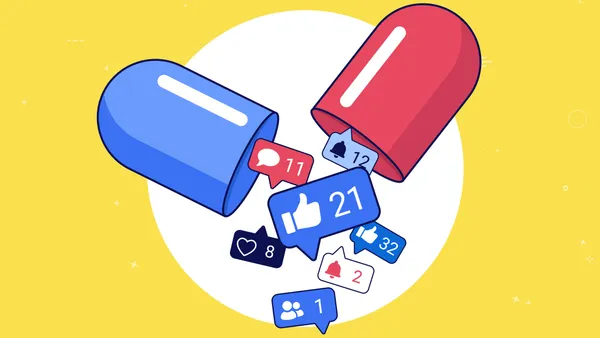Research Shows Twitter Could Help Recruit Cancer Patients
Trending now: Patients use Twitter to find information on cancer clinical trials, yet only one tweet linked to a patient recruitment website.
Twitter may be an effective, untapped resource to stimulate interest in cancer clinical trials and boost enrollment, physicians at the Abramson Cancer Center of the University of Pennsylvania suggest in a research letter in JAMA Oncology.
In the pilot study, researchers analyzed a randomly chosen sample of 1,516 tweets out of a total of 15,346 unique tweets that contained the words “lung cancer" from January 5 – 21, 2015. What the study uncovered was that virtually none of these tweets were used for recruitment nor did they provide links to enrollment websites. Only one tweet linked to a patient recruitment website. The majority of tweets analyzed (56%) focused on giving and receiving psychological support or dialogues about prevention. Almost 18% (221) of tweets were about clinical trials, 42% of which were tweeted by individuals (including self-identified patients, health professionals, advocates, and non-health users).
The majority of these clinical trial tweets were about human research involving a drug or a device, and quite a number were focused on the excitement around immunotherapy, which was still investigational at the time of the study. Among the therapeutic clinical trial tweets, 79% (144 of 183), in fact, concerned immunotherapy and 86% (158 of 183) had embedded links directing users to relevant news articles.
UnitedHealthcare and Qualcomm Launch Wearable Device Coverage Plan
 UnitedHealthcare and Qualcomm have launched a new wellness program that provides members with wearable devices at no additional charge and enables them to earn money by meeting certain goals for the number of daily steps. The collaboration will focus on UnitedHealthcare programs and services that incorporate the latest generation of wearables, medical devices, and home diagnostic tests that use Qualcomm Life’s 2net Platform for medical-grade connectivity. The wellness program and related fitness trackers are being offered initially to companies with 101 to 300 employees with a fully insured health plan. Employees and their covered spouses receive custom-designed wearable devices that track the number of steps users take each day. Unlike other wearable devices that simply track the total number of steps, the UnitedHealthcare Motion devices tabulate the total number, frequency and intensity of the steps taken, providing a more accurate and comprehensive summary of the user’s daily activity. The data are then sent to the UnitedHealthcare Motion app, which is powered with seamless and secure connectivity through Qualcomm Life’s 2net Mobile connectivity platform.
UnitedHealthcare and Qualcomm have launched a new wellness program that provides members with wearable devices at no additional charge and enables them to earn money by meeting certain goals for the number of daily steps. The collaboration will focus on UnitedHealthcare programs and services that incorporate the latest generation of wearables, medical devices, and home diagnostic tests that use Qualcomm Life’s 2net Platform for medical-grade connectivity. The wellness program and related fitness trackers are being offered initially to companies with 101 to 300 employees with a fully insured health plan. Employees and their covered spouses receive custom-designed wearable devices that track the number of steps users take each day. Unlike other wearable devices that simply track the total number of steps, the UnitedHealthcare Motion devices tabulate the total number, frequency and intensity of the steps taken, providing a more accurate and comprehensive summary of the user’s daily activity. The data are then sent to the UnitedHealthcare Motion app, which is powered with seamless and secure connectivity through Qualcomm Life’s 2net Mobile connectivity platform.
Employees can earn Health Reimbursement Account credits that can total up to $1,460 per year, while employers can obtain premium savings based on program participants’ combined results.
Roche Diabetes Care Announces Accu-Chek Connect Diabetes Management App Now Integrated With HealthKit
 Roche Diabetes Care has created an integration between the Accu-Chek Connect System with the Apple Health app on iPhone. The integration allows patients using the Accu-Chek Connect app to share data with HealthKit and easily view their blood glucose levels and carbohydrates in the Health app alongside other activity and health information. The Accu-Chek Connect system is a diabetes management system that consists of the Accu-Chek Aviva Connect meter, an app and an online portal that allows patients, caregivers, and healthcare providers to view, share, and access blood glucose data anytime, anywhere. In addition, a doctor can activate an insulin dosage calculator on the app, the Accu-Chek Bolus Advisor, which makes it easy to calculate how much insulin is needed at each meal. The meter wirelessly sends blood glucose results to the Accu-Chek Connect app on iPhone. With user permission, other mobile apps such as electronic medical records apps or apps tracking health and wellness that integrate with HealthKit may also access this data. For example, with the help of HealthKit, blood glucose data will now be able to flow seamlessly from the Accu-Chek Aviva Connect meter to the Epic and Cerner EMR software.
Roche Diabetes Care has created an integration between the Accu-Chek Connect System with the Apple Health app on iPhone. The integration allows patients using the Accu-Chek Connect app to share data with HealthKit and easily view their blood glucose levels and carbohydrates in the Health app alongside other activity and health information. The Accu-Chek Connect system is a diabetes management system that consists of the Accu-Chek Aviva Connect meter, an app and an online portal that allows patients, caregivers, and healthcare providers to view, share, and access blood glucose data anytime, anywhere. In addition, a doctor can activate an insulin dosage calculator on the app, the Accu-Chek Bolus Advisor, which makes it easy to calculate how much insulin is needed at each meal. The meter wirelessly sends blood glucose results to the Accu-Chek Connect app on iPhone. With user permission, other mobile apps such as electronic medical records apps or apps tracking health and wellness that integrate with HealthKit may also access this data. For example, with the help of HealthKit, blood glucose data will now be able to flow seamlessly from the Accu-Chek Aviva Connect meter to the Epic and Cerner EMR software.
Consumers’ Use of Health Apps and Wearables Doubled in Past Two Years
The number of U.S. consumers who use wearables and mobile apps for managing their health has doubled in the past two years, according to the results of a survey by Accenture. Specifically, the number of consumers who use mobile health apps increased from 16% in 2014 to 33% today, and the number of consumers who use health wearables increased from 9% to 21% during the same time. The findings are part of a seven-country survey of roughly 8,000 consumers, including almost 2,225 in the United States, with select findings compared with a similar survey of physicians. Of the one in five consumers in the most-recent survey who were asked by a doctor to use wearables to track their health, such as fitness or vital signs, three-quarters (76%) followed their physician’s recommendation. The majority of consumers (77%) and doctors (85%) alike said using wearables helps a patient engage in their health.
Four in 10 consumers (40%) who use health apps have discussed or shared mobile app data with their doctor in the past year. Consumers most frequently use health apps for fitness (cited by 59%), diet/nutrition (52%), symptom navigation (36%), and accessing their patient portal (28%). While the vast majority (90%) of consumers said they would be willing to share wearable or app data with medical providers, far fewer said they would be willing to share that data with their health plans (63%) or employers (31%). (PV)











